By 2030, provide legal identify for all, including birth registration
What does Target 16.9 mean for businesses?
According to the United Nations Legal Identity Agenda, everyone has the right to be recognized as a person before the law and to birth registration. This right is enshrined in various international human rights instruments, including Article 6 of the UN Declaration of Human Rights and Article 7 of the UN Convention on the Rights of the Child.
Target 16.9 is another foundational target to SDG 16 and to the realization of the SDGs more broadly. It acknowledges that without a legal identity or birth registration, over 1.1 billion people will continue to exist in the shadows of the informal economy. Without a legal identity, they are denied access to basic rights and services, including the right to health care, education, finance as well as the right to vote and freedom of movement. Conversely, they are not subject to legal liabilities and responsibilities which, among other things, denies Governments the ability to generate sufficient tax revenue to provide necessary enforcement, infrastructure and other essential services for the formal economy and broader society to function and thrive.
While it may appear that the role of business in providing legal identity is limited, the relevance to a business’ operations and reputation is significant. Indeed, businesses in the information, communications and technology (ICT) sector have partnered with UN agencies, Governments and other experts to provide birth registration and other forms of legal identification (see examples section). Nonetheless, the issue extends to businesses and their supply chains with a number of marginalized/vulnerable populations, including women, children, migrants and refugees, who may be exploited, manipulated or trafficked to work across agriculture, construction, domestic services, manufacturing and other sectors. This problem not only relates to those who are undocumented but also to those who have had their passport or other identity documents confiscated (e.g. kafala system), denying them access to their legal identity and to their fundamental rights. It also has the effect of limiting their freedom of movement and forcing them into a form of indentured servitude or slave bondage — or what is now commonly referred to as modern slavery.
Ultimately, it is in businesses’ interest to ensure that Governments provide access to birth registration and legal identity in order to attract a diverse and thriving workforce and to mitigate the risk of being directly connected to and complicit in the exploitation of marginalized/vulnerable groups.
Legal identity and modern slavery
According to the United Nations, legal identity is defined as the basic characteristics of an individual's identity including name, sex, place and date of birth conferred through registration and the issuance of a certificate by an authorized civil registration authority following the occurrence of birth.
- An estimated 1.1 billion people worldwide cannot prove their identity, limiting their access to legal rights/responsibilities and to other social benefits/services (World Bank, Identification for Development (ID4D) Data Set, 2017)
- Women are commonly denied a legal identity and disproportionately account for the unregistered population, particularly in developing countries. This presents significant legal barriers for women, including opening a bank account, driving a car, obtaining finance and securing land/property rights. (World Bank, Women, Business and the Law Report, 2021)
- An estimated 20.9 million men, women and children worldwide are victims of forced labour, trapped into jobs into which they have been coerced or deceived and which they cannot leave. This captures all forms of forced labour and human trafficking for labour and sexual exploitation. (ILO, Global Estimate of Forced Labour Report, 2012)
How should businesses implement Target 16.9?
Consistent with the UN Guiding Principles on Business and Human Rights (UNGPs) and Children’s Rights and Business Principles, businesses have a responsibility to avoid causing or contributing to any human rights abuses and should seek to prevent, mitigate and, where appropriate, remediate any harm caused. This responsibility includes conducting the necessary human rights due diligence and auditing to identify whether there are any undocumented or unprotected workers in their operations or supply chains.
The Institute of Human Rights and Business (IBHR) released the Fees and IDs: Tackling Recruitment Fees and Confiscation of Workers’ Passports report in 2013, which explains the risks of such activity to businesses and provides guidance on how to address them. In addition, the UN Global Compact together with the International Labour Organization (ILO), International Organization for Migration (IOM) and other partners released an Interactive Map for Business of Anti-Human Trafficking Organisations (2018) to connect businesses with entities focused on combating modern slavery and improving coordination on the eradication of human trafficking.
Businesses in the ICT and related sectors can proactively support UN agencies, Governments and civil society organizations in bringing people out of the informal sector by providing birth registration and legal identity (including digital identity) for all through breakthrough innovation and other technologies — while respecting human rights including the right to privacy.
Here are some ways businesses can take action
Culture
Adopt a zero-tolerance approach against any form of human trafficking or forced labour within a business’ operations, products and services and throughout its supply chain.
Policies and processes
Establish standards that ensure against any harm that a business may cause or contribute to with respect to exploiting vulnerable individuals with no legal identity and/or the confiscation of passports or similar documentation.
Human rights due diligence
Ensure that robust human rights due diligence and auditing processes are applied throughout a business’ own operations and supply chain.
Hotlines and grievance mechanisms
Develop, implement, monitor and adequately resource channel(s) for employees and third parties to report any instances of abuse, exploitation or trafficking against migrants or undocumented persons that a business may have caused or contributed to. Ensure that such instances are also reported to the relevant authorities as required by law.
Education and support
Develop and ensure mandatory training for all employees explaining the possible forms of forced labour and where it can occur.
Reporting and risk management
Ensure that any risks with respect to migrants or undocumented persons are accurately reported and effectively managed. This includes compliance with any national and regional legislation and, wherever possible, other international standards and voluntary benchmarks or frameworks.
Board/management oversight, culture, strategies, policies, operations and relationships
Advocacy
Lead, promote and support the development of and/or adherence to legal and voluntary frameworks that serve to bring people out of the informal economy and to have access to a legal identity. Businesses can and should also advocate for the enactment and enforcement of laws to eliminate abuse, exploitation and trafficking of marginalized persons and migrants, especially with respect to the confiscation of passports or other legal documentation for the purpose of restricting movement and other fundamental rights.
Influence
Support efforts to educate communities and other stakeholders on the possible forms of, and settings where, abuse exploitation or trafficking of migrants and undocumented persons may occur. Encourage them to report any such instances to the relevant authorities.
Capacity building
Provide expertise and technical resources (as appropriate) to assist the UN, Governments and civil society to develop and implement a birth registration and legal identification system. Partner with law enforcement agencies and civil society organizations to identify, apprehend and prosecute any suspected perpetrators of abuse, exploitation or trafficking of migrants and undocumented individuals.
Collective action and partnership
Participate in Global Compact Local Networks or other business/industry association activities that raise awareness and actively address any actual or potential abuse, exploitation or trafficking of migrants and undocumented persons within business operations and relationships. These include programmes to support such persons to secure a legal identity and/or safe work placement.
Institutions, laws and systems at the international, national and municipal levels
Here are some ways businesses are taking action
-
Reviewing Legislation to Improve Birth Registration Practices
DLA Piper partnered with UNICEF to improve birth registration practices by reviewing legislation in numerous jurisdictions across Africa and Asia to assess the consistency and adequacy of the laws in place and target advocacy efforts for key areas for change. The legislative review included a questionnaire for each country to assess whether birth registration is required for access to education, health care and other essential services. (Source)
- ID2020 Digital Identity Alliance
The ID2020 Alliance is a public-private partnership that seeks to advance digital identity programmes through direct funding as well as through evaluating ongoing digital identity programmes — working with partners to implement such programmes — and helping to share technical standards governing digital identity initiatives. Partners include businesses, foundations, law firms and non-governmental organizations. (Source)
- Uganda Telecom Limited and UNICEF Establish Mobile Birth Registration
Uganda’s paper-based system for birth registration poses significant challenges, particularly regarding children born outside of hospitals for whom receipt of birth certificates can take months if they arrive at all. In response, the Ugandan birth registration services bureau is working with Uganda Telecom Limited and UNICEF to automate the registration of births, deaths and marriages through its Mobile Vital Record System to replace paper forms with the use of mobile phones and web-based applications to capture and transmit relevant data directly onto a Government server. (Source)
- Interfaith Mass Wedding and Birth Certificate Programme
Indonesia is a religiously diverse country where cultural tensions are all too often exacerbated by local poverty. Thirty-six per cent of households cannot afford the cost of marriage licenses and without an officially recognized marriage, Indonesian couples cannot obtain identity cards, access health care or obtain birth certificates for their children. Collaborating with business, Government and religious institutions, the initiative facilitates mass weddings where thousands of couples and their children have gained immediate legal status and a renewed hope for the future. This project is a collaborative undertaking by the participating companies of the Global Compact Network Indonesia with the support of provincial governments, non-governmental organizations and universities. It aims to help poor families to obtain their legal identity so that they can access education, health, formal employment, micro-credits and other public services. (Source)
- International Migrants to the Brazilian Labour Market
Executives from 79 Global Compact Network Brazil participant companies and a team of experts have collaborated in generating a report that has highlighted the main obstacles to migrants’ integration in the local market, focusing on companies’ human resources and social responsibility policies. Such obstacles include the limited availability of information and ability to advertise opportunities among the migrants’ community, lack of communication skills and problems with identification documentation required by human resources departments to move from intentions to actions. The research has a special focus on gender issues of the migrant workers and underlines the need to scale effective practices on the part of businesses to reach more migrants. The project’s next step is to use the report conclusions to initiate a series of capacity building workshops to help facilitate legal assistance to migrants in Brazil and promote their access to labour markets. (Source)
- Accurately Reflecting Gender Identity on Birth Certificates for Transgender People
Bryan Cave Leighton Paisner (BCLP) together with Lambda Legal secured a win in the state of Kansas in the United States in the matter of Foster v Andersen, Civil Action No. 18-02552-DDC-KGG in which the ability of transgender people to obtain birth certificates that reflect their gender identity was put into question. BCLP and Lambda Legal argued that denying transgender people the ability to obtain accurate birth certificates violates the Equal Protection and Due Process clauses of the United States Constitution. The United States District Court of Kansas ruled that the Kansas Department of Health and Environment and other Kansas government officials must provide accurate birth certificates that reflect a person’s true sex, consistent with their gender identity. (Source)
Some industries that could/should contribute to achieving Target 16.9
This list is not exhaustive but rather intended to invite businesses to consider how their sector could or should contribute to this target.
ICT industry and emerging technologiesThis sector can support law enforcement agencies in the tracing of abuse, exploitation and trafficking of migrants and undocumented persons. It may also support the UN, Governments and civil society in the establishment of a birth registration and legal identification system.
Primary industries including agriculture, construction and manufacturingThese sectors are most directly susceptible to such risks and should pay particular attention to human rights due diligence processes in the identification/mitigation of abuse, exploitation or trafficking of migrants or undocumented persons within their own operations. For instance, on major building/construction sites, farms or in factories.
Secondary industries such as consumer goods and servicesThese sectors are similarly exposed to such risks and should pay particular attention to human rights risk assessments, due diligence and auditing throughout their supply chains. For instance, in the cultivation or preparation of consumable goods, manufacturing of clothing and footwear, in the servicing of hotels, etc.
Some intersections with Target 16.9 and the Ten Principles, UNGPs and SDG16+
These intersections are not exhaustive but rather intended to demonstrate how foundational SDG 16 and, specifically, this target is.
Inspired by the Ten Principles and UNGPs
Corruption and organized crime, children’s rights, human trafficking/modern slavery, gender-based violence, ethnic minorities, undocumented individuals
Inspired by the Pathfinders SDG16+ Roadmap
SDG 1
Institutions and policies for poverty eradication (Target 1.b)

SDG 1
SDG 4
- Equal access to education (Target 4.5)
- Culture of peace and non-violence and education on human rights and gender equality, promotion of global citizenship (Target 4.7)
- Education facilities (Target 4.a)
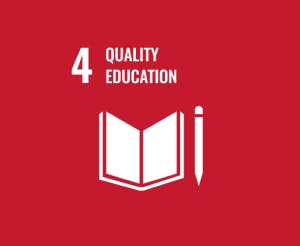
SDG 4
SDG 5
- Discrimination against women and girls (Target 5.1)
- Violence against women and girls (Target 5.2)
- Child and forced marriage and female genital mutilation (Target 5.3)
- Women’s participation and leadership (Target 5.5)
- Policies and legislation for gender equality (Target 5.c)
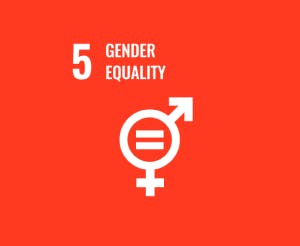
SDG 5
SDG 8
- Equal pay for work of equal value (Target 8.5)
- Forced labour, modern slavery and human trafficking, including child labour (Target 8.7)
- Labour rights (Target 8.8)
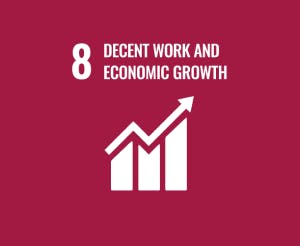
SDG 8
SDG 10
- Social, economic and political inclusion (Target 10.2)
- Equal opportunity laws, policies and practices (Target 10.3)
- Policies for greater equality (Target 10.4)
- Safe migration policies (Target 10.7)
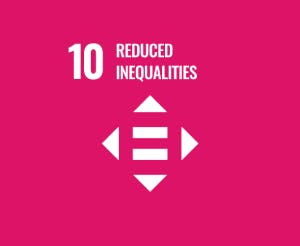
SDG 10
SDG 16
- All forms of violence (Target 16.1)
- Abuse, exploitation, trafficking of children and violence against children (Target 16.2)
- Access to justice and rule of law (Target 16.3)
- Illicit financial flows, and organized crime (Target 16.4)
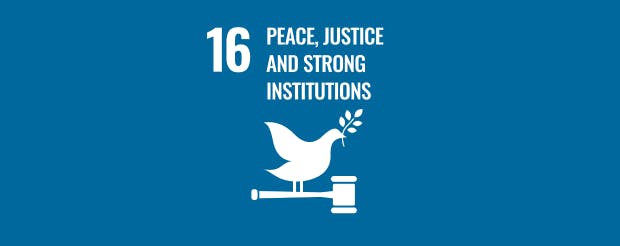
SDG 16
SDG 17
- Tax collection (Target 17.1)
- Equitable trade system (17.10)
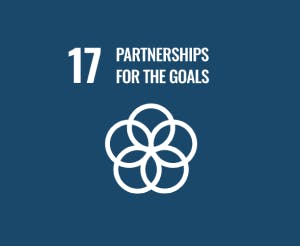
SDG 17
- ID2020 Digital Identity Alliance
